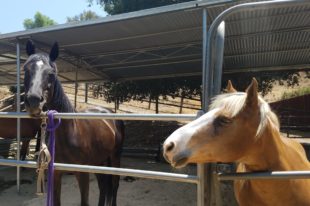 It can be hard to join a group of people you don’t know. The same goes for horses. Joining a new herd is a process!
It can be hard to join a group of people you don’t know. The same goes for horses. Joining a new herd is a process!
There are ways to make the transition into a new group a little easier for both the individual joining and the existing members. Check out these tips for joining a new group, inspired by Lady’s experience.
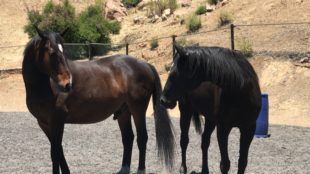 Listen and Be Curious: By really observing, listening and paying attention, Lady was able to learn who was who in the herd. She was able to get a sense of each individual rather than making judgements based on first impressions. By being curious about how the group was already working, she was able to gain a greater understanding about what role each member filled — who was the “boss”, which members were paired up, and who might make a good ally for her. This knowledge of the group gave her an opportunity to figure out how she could fit in without stepping on anyone else’s toes.
Listen and Be Curious: By really observing, listening and paying attention, Lady was able to learn who was who in the herd. She was able to get a sense of each individual rather than making judgements based on first impressions. By being curious about how the group was already working, she was able to gain a greater understanding about what role each member filled — who was the “boss”, which members were paired up, and who might make a good ally for her. This knowledge of the group gave her an opportunity to figure out how she could fit in without stepping on anyone else’s toes.
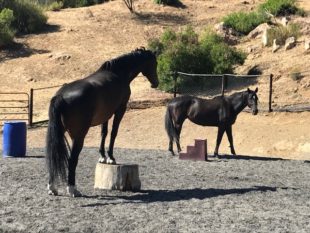 Be Respectful: When the other horses would show Lady “what’s what” she was respectful — she didn’t immediately challenge or question why things were the way they were. Instead, she listened to what they had to say and honored their wishes. This doesn’t mean Lady will never challenge the others, but as a new member it is important to have respect for the way things already are and then do your best to understand them before trying to make changes.
Be Respectful: When the other horses would show Lady “what’s what” she was respectful — she didn’t immediately challenge or question why things were the way they were. Instead, she listened to what they had to say and honored their wishes. This doesn’t mean Lady will never challenge the others, but as a new member it is important to have respect for the way things already are and then do your best to understand them before trying to make changes.
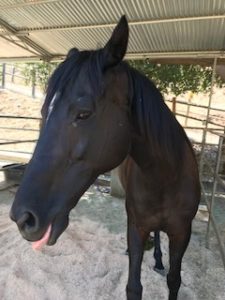 Be yourself. When Lady first entered the arena with the others, she quickly showed everyone her big “horsenality”. She ran, rolled around, played, jumped and kicked up her heels. All the others took notice and became curious about what she had to say. Although, she was a new member, she didn’t stifle the major parts of her personality. Balanced with good listening skills and respect, Lady was free to be herself. Being herself helps the others learn more about her, figure out how to relate to her, and determine an appropriate role for her in the group.
Be yourself. When Lady first entered the arena with the others, she quickly showed everyone her big “horsenality”. She ran, rolled around, played, jumped and kicked up her heels. All the others took notice and became curious about what she had to say. Although, she was a new member, she didn’t stifle the major parts of her personality. Balanced with good listening skills and respect, Lady was free to be herself. Being herself helps the others learn more about her, figure out how to relate to her, and determine an appropriate role for her in the group.
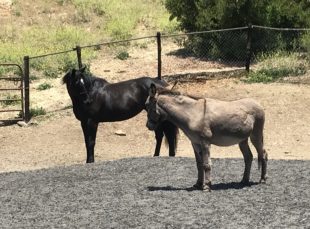 Communication: Communicate with your group. The horses in the herd are constantly communicating with each other. The more they communicate, the more they are able to understand each other’s needs and be good herd-members. Communication engages you with the others and it gives them an idea of who you are and what you have to offer the group.
Communication: Communicate with your group. The horses in the herd are constantly communicating with each other. The more they communicate, the more they are able to understand each other’s needs and be good herd-members. Communication engages you with the others and it gives them an idea of who you are and what you have to offer the group.
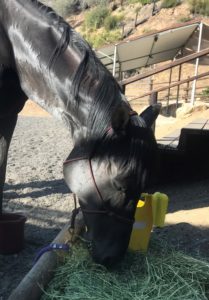 Patience and Courage: Things take time. Some horses (people, too) take longer to warm up to. The more patient you are with the new group, and yourself, the more chances there are to learn about each member and the group dynamics. For Lady, there were a couple horses that would shoo her away from the food. This was a clear message to show dominance, which Lady listened to and respected. Then, after some time she would come closer, very slowly, little by little, all the while listening to what the others kept saying (which was often “no you can’t eat here”). With patience and persistence, Lady continued to gently assimilate herself into the group. By showing them that she was respectful of the existing structure, while also asking for what she would like, Lady eventually convinced the others that she was was worthy and they allowed her to have a seat at the table.
Patience and Courage: Things take time. Some horses (people, too) take longer to warm up to. The more patient you are with the new group, and yourself, the more chances there are to learn about each member and the group dynamics. For Lady, there were a couple horses that would shoo her away from the food. This was a clear message to show dominance, which Lady listened to and respected. Then, after some time she would come closer, very slowly, little by little, all the while listening to what the others kept saying (which was often “no you can’t eat here”). With patience and persistence, Lady continued to gently assimilate herself into the group. By showing them that she was respectful of the existing structure, while also asking for what she would like, Lady eventually convinced the others that she was was worthy and they allowed her to have a seat at the table.
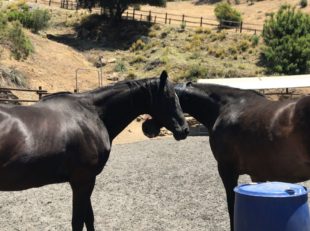 When joining a new group, like a sports team, a team at work or even a new family, the key is to be open to the new experience. We all want to be cared for, respected, and heard. Showing others that we have the ability to do those things is an essential part of building trust. Although navigating group dynamics and different personalities can be challenging, the benefits of connecting can be well worth the effort!
When joining a new group, like a sports team, a team at work or even a new family, the key is to be open to the new experience. We all want to be cared for, respected, and heard. Showing others that we have the ability to do those things is an essential part of building trust. Although navigating group dynamics and different personalities can be challenging, the benefits of connecting can be well worth the effort!
